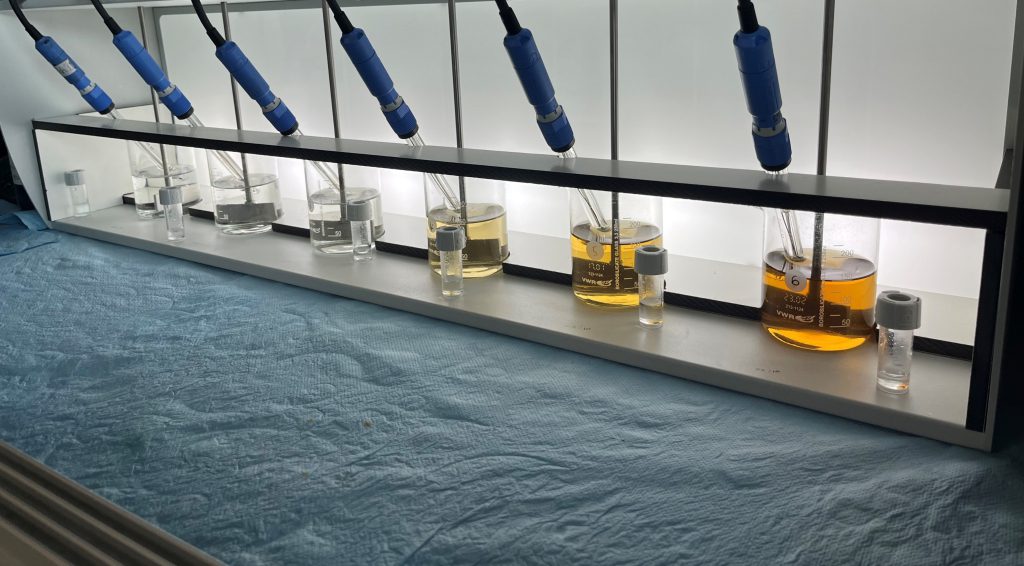Modelling coagulation/flocculation processes in complex matrices
Data-driven and kinetic modelling to control coagulation/flocculation processes in complex matrices
Coagulation and flocculation processes are conventionally applied to remove suspended solids from water bodies and reduce the emissions of harmful particles into the environment after treatment processes. While effective for larger solids, its effectiveness reduces with smaller particle sizes, leading to emissions of substantial amounts of (potentially harmful) micro- and nanoparticles, such as nanoplastics and metal/metal oxides. While coagulation and flocculation processes have widely been applied, they are currently considered more of a “craft” than based on science. Several models have been developed to describe coagulation-flocculation processes. However, the complex interactions of particles in different water matrices make it hard to apply these models effectively. To address uncertainties in new applications, experimental validation of each new condition is still required. While providing insight, slight variations in environmental conditions can introduce differences in coagulation/flocculation processes, impacting the process’s effectiveness. To address this, there is an interest in novel modelling approaches that can support process control and optimization.
Research challenges
This project aims to improve our understanding of coagulation and flocculation processes and get better insights into the effect of process and environmental conditions on the removal of micro- and nanoparticles. Currently, coagulation and flocculation processes heavily rely on labour-intensive empirical approaches like jar testing that only capture the complexity of the current test conditions. Most available datasets are incomplete and insufficient to get a clear insight into the process. To elucidate relevant process indicators and be able to describe the coagulation and flocculation process, there is a need to perform experiments and create reliable datasets under a variety of conditions. These datasets can subsequently be used to get a greater understanding of the coagulation-flocculation process, subsequently leading to new, effective kinetic and data-driven models that can help to optimize the process.
Your assignment
You will improve the general understanding of coagulation-flocculation processes in a broad range of conditions to enhance the process control and removal of suspended solids in the micro- to nanometre range. You will analyse extensive data sets to identify key parameters affecting the removal process. Using the identified key parameters, you will develop a reliable database of the coagulation-flocculation process. The produced datasets will be used to obtain key insights into the coagulation/flocculation process by employing known modelling approaches, such as population balance equations and data-driven and kinetic models. To finalize, you will use the acquired information to help formulate new, efficient approaches to perform and optimize the coagulation-flocculation processes in complex environmental and industrial wastewater matrices.
Your profile
You have a MSc in chemical engineering, (analytical) chemistry, chemometrics, or equivalent. You are an independent, motivated student with an affinity for multi- and interdisciplinary research that has previous experience with data-driven modelling and is willing to delve into topics outside your current knowledge base. You like working in a dynamic environment and enjoy tackling challenges as they arise.
Keywords: Data-driven modelling; micro- and nanoparticles; process optimization;
Professor/University group/Wetsus supervisor(s):
University promotor and co-promotor: Dr. Claire Chassagne & Dr. Caroline Fiório Grilo (Delft University of Technology, Faculty of Civil Engineering and Geosciences, Department of Hydraulic Engineering, Environmental Fluid Mechanics); Wetsus daily supervisor: Dr. Sam Rutten (Theme coordinator Advanced Coagulation for Nanoparticles)
Project partners: Advanced Coagulation for Nanoparticles
Only applications that are complete, in English, and submitted via the application webpage before the deadline will be considered eligible.
Guidelines for applicants: https://phdpositionswetsus.eu/guide-for-applicants/
